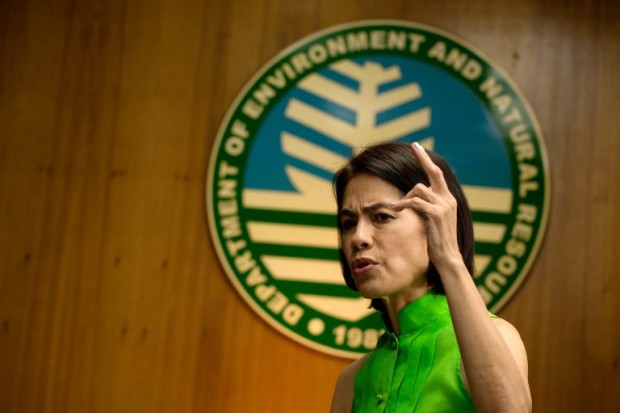UP geoscience studes, prof oppose Lopez confirmation

This picture taken on February 22, 2017 shows Philippines’ Department of Energy and Natural Resources (DENR) Secretary Regina Lopez gesturing during an interview at the DENR building in Manila.
After two decades as a yoga missionary, Philippine Environment Secretary Regina Lopez is unleashing her inner rage on the mining industry while aiming for Bhutan-style gross national happiness. AFP
Several students and a professor of the geosciences department of the premier state university have made their stand to oppose the permanent appointment of Gina Lopez as Environment Secretary, following her controversial orders to close 23 mines and suspend five others.
In a press conference at the University of the Philippines National Institute of Geological Sciences (UP-NIGS) in Diliman, Quezon city on Monday, positions against Lopez’ confirmation were announced by the UP Geology Majors’ Society, the Iuvenis Orbis Geological Fraternity, the UP 49ers, StandFirm, and even former UP-NIGS head and now professor Carlo Arcilla.
The UP groups were joined by representatives of the Philippine Business for Environmental Stewardship and the Chamber of Mines, as well as indigenous peoples’ leaders from mining communities in Surigao del Sur and South Cotabato, who had likewise registered their opposition to Lopez’ confirmation at the Commission on Appointments.
“With the DENR Secretary-designate Gina Lopez’ persistent unscientific and illegal actions, we found her unworthy to remain in that position,” said geology student Ralph Lauren Abainza, reading out the statement of the UP Geology Majors’ Society. “Being a Secretary is not as simple as being an advocate. It requires more than emotion to create unbiased and scientifically correct decisions. But she is not doing these things,” he said. Abainza called out Lopez for her “absurd” and “misleading” statements on geology, such as when Lopez linked earthquakes with mining processes.
“As geology students, we, too, are environmentalists. We live the environment so much that we chose to dedicate our lives studying its process,” Abainza pointed out. “If we have very strict laws with responsible mining, then, we, too, shall uphold high standards for responsible environmentalists,” he added.
Article continues after this advertisement“My main purpose for opposing Gina Lopez is because of students who will be losing jobs. We are not bad people. We do not teach our students to do bad, to rape our environment,” said professor Arcilla. “The most grating part is when people say ‘We are the only ones who know how to love the country and the environment.’ That is a big insult, because at the end of the day, it is not the non-government organizations who will clean up the environment, but the engineers and the scientists.”
Article continues after this advertisement“We are looking at the wrong problem and putting the blame on mining, when this has been happening in the past. We should look at the root of biodiversity loss, which is deforestation, ‘kaingin,’ and illegal logging,” added Arcilla.
While admitting that irresponsible mining also had adverse environment impacts and “give us a bad name,” Arcilla underscored that “only in 3 percent of 30 million hectares of land are there mining tenements, so that’s less than one percent of 30 million. So how can something being done in only one percent of the country be responsible for such massive pollution and degradation by the environment?”
Arcilla also called out Lopez for always showing denuded areas as mining sites, showing his own pictures of several mine sites that have already been reforested and rehabilitated. The professor compared the situation to an unruly construction site, versus a finished building. “The problem is just because it looks ugly, it gets blamed as something bad,” he quipped.
Arcilla maintained that “mining is needed.” “People are not anti-mining. They are anti-pollution. And poverty is the greatest polluter…Pag ang tao gutom, ang last na iisipin niya ay ang kapaligiran niya. Pagkain muna iisipin,” he said.
On Lopez’ statements that mining causes poverty, Arcilla countered: “We need to think about it more closely: Are the areas poor because of mining, or even before the mines, they were already poor?” He pointed out that crops were hard to grow in heavily mineralized lands and that mining companies help in procuring education and scholarships for the community so they can undertake other livelihood.
Arcilla also rolled out data from 2015 to debunk Lopez’ presentations and statements showing tourism could earn income better than mining, or that mining had minimal contribution to the economy and to employment.
Arcilla had also backed the students’ claim of Lopez’ “conflict of interest” by pointing out that several Lopez companies have engaged in quarrying (a form of mining), put up renewable energy plants in watersheds, and was even responsible for a gas leak in Bangkal, Makati. JE